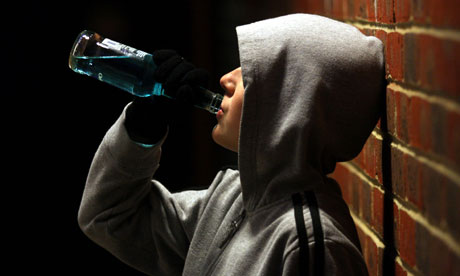
The proportion of teenagers drinking is falling, but those who are drinking are doing it with a vengeance. Among the half of girls under 15 who say they drink, the average intake is the equivalent of six glasses of wine (just over 11 units) a week. Boys (again of the half who say they drink) have an average of 11.9 units a week. No one wants to think of their teenage son or daughter getting drunk and disorderly or in danger, but what can you do to stop it happening?
What age should you talk to them?
Surveys show that attitudes to drinking change at the age of 13, which is around the average time for children to have their first alcoholic drink. So if you wait until mid-teens the moment will have passed. Start talking about alcohol when your child is 11 or 12. The Chief Medical Office recommends that children shouldn't drink until they are 15. Between 15 and 17, the guidelines are for supervised drinking with adults, on no more than one day a week. From the age of 16 you can buy your child cider, beer or wine in a pub or restaurant if they eat with you.
There's evidence that the younger a child is when they start drinking (especially under 15) the more likely they are to have alcohol-related problems later in life – such as accidents while under the influence, drink-driving, and absences from work due to hangovers.
What are the dangers of teenage drinking?
Teenagers who drink are at risk of alcohol-related accidents; being assaulted or starting a fight; having sex (especially unsafe sex) with people they wouldn't normally have sex with; drinking and driving (or being in a car driven by a drunk driver); being robbed; getting a criminal record; and becoming ill from too much alcohol. There is some evidence that people are getting cirrhosis of the liver earlier because of the rise in heavy drinking in some young people.
What should you say?
Don't say: "Just don't drink – it will harm/kill you" because it won't work. It's not like telling a child to go to bed – it requires (sigh) a conversation. You need to equip your teenager with the information to make sensible decisions because without that he or she will struggle to resist the peer pressure to glug down some alco-pops at the next birthday party.
Parents are hugely influential – heavy drinkers have children who drink more – so watch your own intake. Children need to see your attitude to alcohol is as sensible as the messages you're giving them. So don't binge drink yourself and collapse on the sofa.
Tell your children that drinking can do more damage to their growing bodies than to those of an adult, so they shouldn't really be drinking at all. Explain about the alcohol content of drinks – they may not know they vary or the difference between wine and spirits. Tell them about units and that they shouldn't go above two to three a day when they are 18. Warn about the risks of going off with strangers, getting into fights, unsafe sex and drink driving and the signs of becoming ill after drinking too much alcohol. Urge them to eat when they drink and to alternate alcohol with water or juice. Encourage them to stay with friends if they are drinking and to keep enough money for a taxi and always to use a number of a firm you know. It is best if they do not take drinks from strangers or get half drunk before they go out to a party. Since most of the alcohol teenagers drink comes from their home you may want to hide your drinks stash.
Tell them what to do if they get into trouble (call you – make sure they leave their mobile on) or if a friend becomes unwell (put them into the recovery position, make sure they can breathe, don't leave them, call for an ambulance) and if they vomit, however horrible it may be, make sure they can still breathe.
When your teenagers go off to college it is worth reinforcing the safety messages even if they don't seem to be listening. If your child does come home drunk it may be better not to shout at them, but to calmly reinforce the risks of drinking and then ground them for a month.
Anything else you should do?
Know where your teenager is going and who they are going with. If you can, drop your teenager off at parties and collect them – even if it means hiding your car round the corner.

